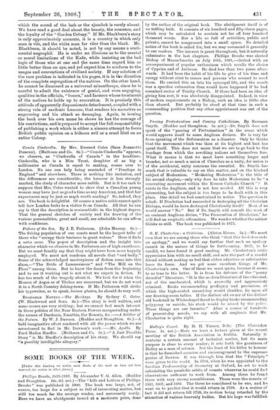Passing Protestantism and Coming Catholicism. By Newman Smyth. (Hodder and
Stoughton. 55. net.)—Dr. Smyth does not speak of the "passing of. Protestantism" in the sense Nhich would approve itself to some Anglican divines. Re is very far from speaking of the Reformation. as a disaster. Only he thinks that the movement which was then at its highest and best has spent itself. This does not mean, that we are to go back to the bondage from which the revolting nations set themselves free. What it means is that we must have something larger and broader, not so much a union of Churches as a unity, for union is of the accidental, unity concerns the essential. Dr. Smyth has much that is valuable to say on this matter, and on the kindred subject of Modernism. "Mediating Modernism" is the title of his second chapter,—only why does he take Modernism to bo "a renovating movement within the Roman Catholic Church " It exists in the Anglican, and is not less needed. All this is very interesting, but the subject is too large to be dealt with in this place. One detail we feel constrained to notice. The question;is asked : If Diocletian had succeeded in destroying all the Christian Bishops, would he have destroyed Christianity itself? Most of us would answer " No." But if Dr. Smyth will consult the work of an eminent Anglican divine, " The Persecution of Diocletian," he will find an emphatic affirmative. We wonder whether the author thinks so still. The book was published in 1875.










































 Previous page
Previous page